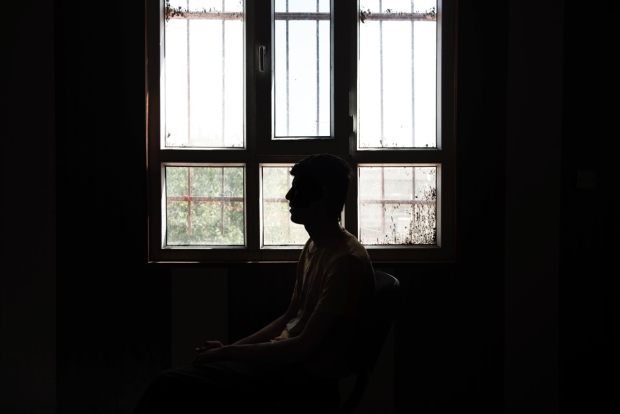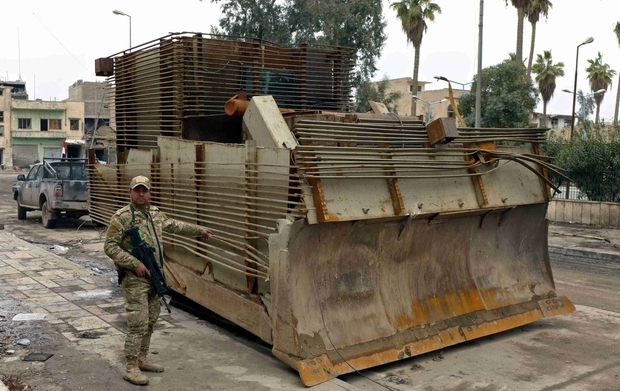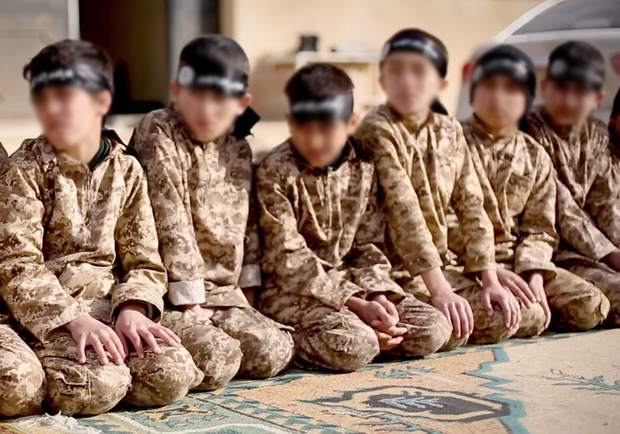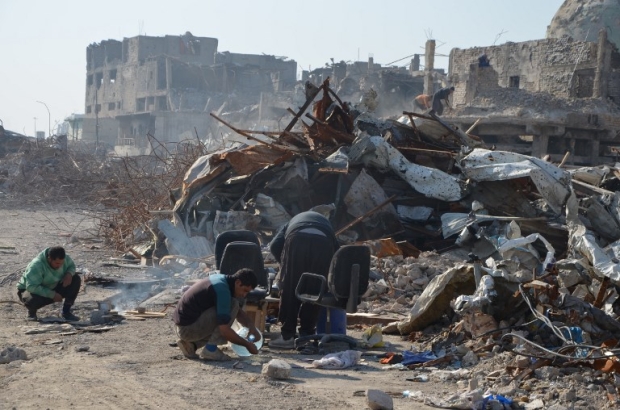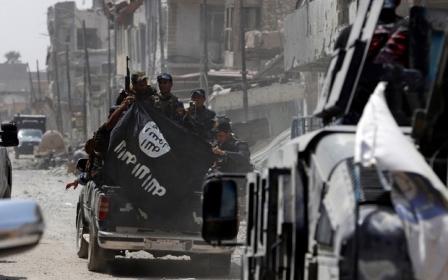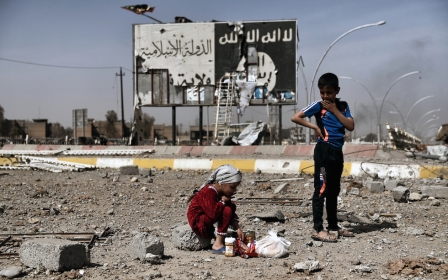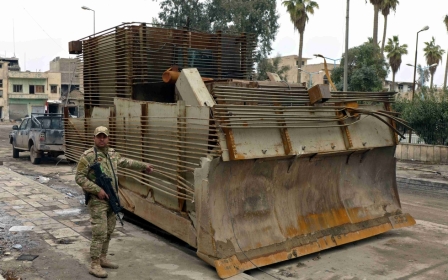After Mosul: The one-legged teen still dreaming of dying for Islamic State
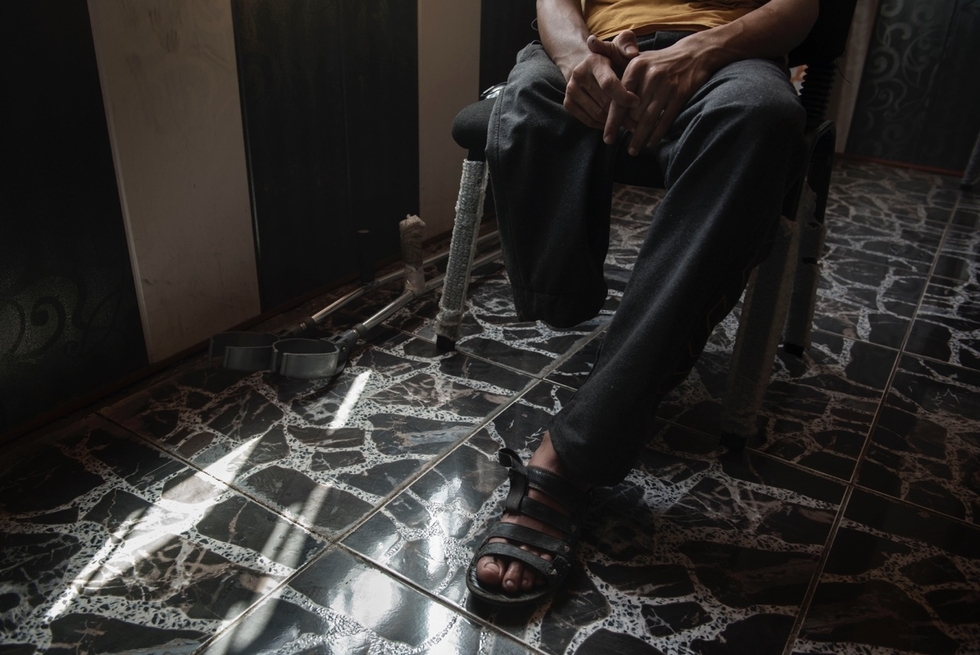
Ahmed is 16. He has the provocative smile and attitude of a teenager who is not afraid to say what he thinks, even if what he thinks is that he would like to die in the name of Allah.
Until May, Ahmed, not his real name, lived in western Mosul but he was not a civilian in search of escape.
Ahmed lost his right leg three years ago, he said, in a coalition air strike on the Islamic State (IS) training camp where he and other child recruits were taught to fight and die.
Despite his invalidity and his subsequent arrest and detention by Iraqi intelligence, Ahmed says his desire to carry out the mission for which he was trained remains undimmed.
"Martyrdom is the ultimate goal of Islamic State fighters, it is our desire, the desire of every fighter," said Ahmed, speaking to Middle East Eye in the presence of an Iraqi intelligence officer at a safe house in Qayyara, a town south of Mosul.
"It is a degree that no human on earth can reach unless he fights with ISIS [an alternative acronym for IS]. The desire of every soldier is martyrdom, and the highest rank of all fighters is the martyrdom mission."
Ahmed is one of many hundreds of minors arrested by Iraqi security forces since the beginning of the offensive to liberate Mosul.
Many of them are now in prison in Baghdad or Erbil, in Iraqi Kurdistan, but some remain in Qayyara where they are hidden in safe houses by Iraqi intelligence officers who interrogate them or use them as informers amid fears that IS sleeper cells are still present in Mosul and planning retribution.
“Many of these kids have active contacts with sleeping cells that are far from being destroyed. Indeed, they are active and will be more dangerous in the coming months,” Fasi, the intelligence officer, told MEE.
'The beginning of the war'
Ahmed’s father was a soldier in the Iraqi army who was killed three years ago by IS, Fasi said.
“Despite this, Ahmed, his older son, joined them. This guy is not just a source of information for us. We need to figure out what will happen in the future, and what the people of Mosul will have to face."
Ahmed represented the “deep roots” of IS, he added. “He reminds us that regaining Mosul is not the end, but only the beginning of the war.”
When he came to escort us to the safe house to meet Ahmed, Fasi told MEE he had been awake for 30 hours already and had just orchestrated the arrest of the wife of an IS senior leader.
“A source told us that she was living in eastern Mosul with her five children. No one had managed to arrest her, but I did it. And be sure she will stay here for a long time. She is not innocent,” said Fasi.
Being an intelligence agent feels more like a mission than a job, he said.
Fasi was born in a village near Hawija, in Kirkuk governorate, an IS stronghold and one of the last areas of Iraq to be recaptured from the militants.
"IS did not start in 2014," Fasi said, slowly sipping his coffee as he recalled the influence that Abu Musab al-Zarqawi, the founder of al-Qaeda in Iraq who was killed in a US air strike in 2006, had exerted on his peers.
“In my village there were two possibilities: radicalising or choosing to save yourself. I chose books. I read and I studied,” he said.
"That's why I think the real war begins now. This is the reason why I decided to work on younger ones, and for this I decide how to hold them, how to interrogate them and where it is more useful for them to stay."
'They just cut off my leg'
When we arrived in Qayyara, Ahmed was sat on a couch watching an American movie, the crutch that he uses to walk leaning on a chair alongside him.
“Hundreds of kids were killed. They just cut off my leg,” he said recalling the coalition air strike three years ago that left him an amputee.
MEE cannot corroborate details of Ahmed’s story but the US-led air campaign has been blamed for many hundreds of deaths in Mosul.
The air strike came weeks after he had pledged allegiance to Abu Bakr al-Baghdadi, IS’s self-styled caliph, at the age of just 13.
"Our families did not know anything, we decided to go without coercion, I decided with my dearest friends to join IS. We were the centre of the world, the capital of the caliphate, and we knew it then, as we know it now," said Ahmed.
When the training camp was hit, a high-ranking commander gathered the survivors, telling them it was time to target European countries in retaliation.
"They killed our children, we will kill theirs. We will arrive in their homes. We will destroy their lives," he told them, according to Ahmed, whose voice filled with anger, resentment and desire for revenge as he spoke.
To participate in a martyrdom mission you had to wait for your turn, and often there were hundreds of fighters in the queue
- Ahmed, IS child fighter
With only one leg, he said, he was repeatedly overlooked for sought-after car-bombing missions.
"To participate in a martyrdom mission you had to wait for your turn, and often there were hundreds of fighters in the queue. The desire of each martyr is to get a Hummer vehicle or a Silverado pick-up, an armoured one.
“Everyone wants bigger vehicles because they kill more people. And the more people the fighter kills, the more he will be rewarded."
Those who could not get a car bomb were tasked with blowing themselves up with suicide belts.
"Everyone wants to die. All the boys wanted to die," Ahmed said. "Three of my dearest friends are martyrs. One of them was the son of the pharmacist, a wealthy family. He was 15 and he wanted to be a martyr and he cried a lot when his commander told him to wait for his turn."
“One day the commander gave him a bag, a backpack with a detonator, he headed for a base of the Iraqi army. He killed nine infidels. And he was a good football player. He was very fast."
Foreign fighters were 'fiercest'
Ahmed said he has seen hundreds of foreign fighters, including many women in Mosul, from countries including France, Belgium, Azerbaijan and Tajikistan.
“The women were armed like men, they had their own weapons. Foreign men and women were the fiercest fighters. They came from all over the world to become martyrs."
One day his commander gave a public speech to hundreds of foreign fighters, urging them to return home and to persuade their friends and relatives to stay in Europe because Europe would be the next battlefield.
“We are enough here, stay in Europe and kill there. If you cannot find weapons, take knives and kill them in the crowded streets, use cars, burn their homes. Kill their children."
The speech reflected the words of Abu Mohammad al-Adnani, IS’s chief propagandist who had called for IS supporters to mount improvised attacks in Western countries.
Adnani wanted it, Ahmed said, "and we all had to do our best to kill as many people as possible".
At least half a million children in Iraq lived for three years under IS rule and many of them, like Ahmed, were educated and indoctrinated in the group’s murderous ideology.
As we drove away afterwards, he spoke loudly of what we had heard.
"He really wants to die, it is his deep desire, we must work on this desire of death. These guys do not want just to kill, they have a deep desire to die, and it is the most dangerous thing that IS has rooted in these little boys: they are ready for everything and every kind of violence is normalised for them.”
Zarqawi 'a hero'
But questions hang over the way in which former suspected IS fighters have been detained and the conditions in which they are being held.
When MEE asked Fasi what happens to detainees in prisons, where there is no distinction between minors and adults and where journalists cannot enter, he shook his head and would not answer.
"There are no real deradicalisation projects," he said when pressed.
This is one of the crucial post-war problems, the risk that the detention of hundreds of children trained and educated by IS could itself feed a further cycle of violence in the future.
"These boys cite Zarqawi as a hero, as an example to follow, deep inside of me I know these guys are victims, and maybe victims twice, because often they were forced by their own fathers, but I understand the feeling of revenge that animates the people of Mosul,” said Fasi.
Every day too there are new episodes of retaliation against families suspected of links to IS.
At least 170 families have been forcibly moved by Iraqi security forces into “rehabilitation” camps east of Mosul, which they cannot leave, Human Rights Watch reported in June.
"Iraqi authorities should not punish entire families because of the actions of their relatives," said Lama Fakih, deputy Middle East director at Human Rights Watch.
"These abusive acts are war crimes and are sabotaging efforts to promote reconciliation in areas retaken from ISIS."
In Qayyara many houses associated with IS supporters have been burst down. Some citizens also compiled a list of 60 families who were threatened with death if they did not leave the village immediately.
The same thing happened in Hamam al-Alil, 30 kilometres south of Mosul, where the houses of relatives of IS fighters were vandalised and their relatives forced to leave.
The fate of many men who were rounded up in the last weeks of the battle for Mosul, when Iraqi generals considered anyone of fighting age still in the city to be a possible IS accomplice, remains unknown.
Some say they would like to kill all of them, regardless of their age.
"There is no chance for them, they were raised in the name of hatred and cannot change, so we should kill them," Ali, a young soldier in Badosh, told MEE.
Others simply pray that they will never again find themselves faced by a young boy with an explosive belt.
"When I saw a child blowing himself up in the frontline I vomited for a whole day thinking about my own son," said another soldier.
'We are not ready'
In Mosul, the challenge is to rebuild the city and to rehabilitate a civilian population traumatised by three years of violence even as the threat of further random attacks and sectarian tensions remains high.
Defeating IS in Mosul does not mean that we have destroyed its roots
- Fasi, Iraqi intelligence officer
"Defeating IS in Mosul does not mean that we have destroyed its roots or resolved the deep reasons that generated it,” said Fasi.
Fasi describes Ahmed as "a survivor" but when asked what his fate and that of others like him will be, he shook his head.
"Iraq is not ready to reintegrate these guys. We are not ready,” he said.
Ahmed, meanwhile, remained vengeful, unable to hide his lack of remorse or disdain for his captors.
“If you think the ideals of ISIS will end with the war, you're wrong,” he told us before we left.
It did not matter, he said, if IS lost Sirte, Mosul, Raqqa, or whichever capital of its fast-shrinking territory fell next, because the ideals of the caliphate would endure.
"They're just pieces of land," Ahmed said. "We can lose them any time. Getting rid of us is getting rid of the Quran: impossible. We are the people of the future, and even though this war is lost, we must continue for our Prophet, the message will continue until the end of the world.”
Today Ahmed no longer lives in Qayyara.
After weeks of questioning, Fasi decided he could not get any more information from him and so he sent him to the prison in Baghdad where most of those suspected of being close to IS are being held.
MEE asked him whether there were any projects there that might benefit the 16-year-old, challenge his views, and perhaps open up a future path to rehabilitation, but Fasi is sceptical.
"He was dangerous,” he replied. "Most likely he will not change.”
This article is available in French on Middle East Eye French edition.
Middle East Eye propose une couverture et une analyse indépendantes et incomparables du Moyen-Orient, de l’Afrique du Nord et d’autres régions du monde. Pour en savoir plus sur la reprise de ce contenu et les frais qui s’appliquent, veuillez remplir ce formulaire [en anglais]. Pour en savoir plus sur MEE, cliquez ici [en anglais].


